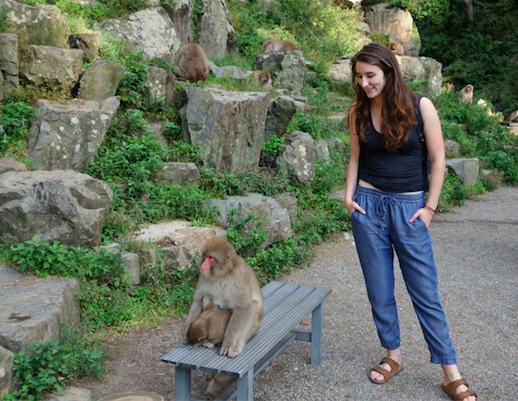Eating a Corncake, in an Elevator, in Vietnam

It was the beginning of her senior year and Sophie Weir (‘15) was slowly burning out. Her senior fall, notorious at Urban for college apps, standardized tests, and a general ambiance of stress, had overlapped with her dreaded four solids term. Frankly, Weir was feeling a little over school.
So when her best friend, Emily Miller (’15), approached Weir with the idea that they put off their first year of college and instead travel the world, she thought this was the perfect solution. “I was excited to learn who I was outside of an academic context,” Weir told me over a three-way Skype with Miller. “I’d always been in school, so I didn’t really know who I was beyond that.”
Weir and Miller decided to take a gap year.
The gap year— the year that some decide to take between high school graduation and college—can take many different forms. According to the American Gap Association, interest and enrollment in gap year programs continue to grow as students feel more drawn to dedicating a year of service, work experience, travel, or general self-discovery. Gap year options can range from spending the year working here in San Francisco to paying for 9-month adventure expeditions across Australia, New Zealand, and Fiji, to learning how to dog sled in Alaska.
For Weir and Miller, the destination was South-East Asia. They decided to teach English in Vietnam, a country that they were eager to visit and had also heard would be safe for women travellers. “We thought we would be assistant teachers,” explained Miller. “Or that we’d be tutoring.”
But it didn’t turn out that way.
On their first day of work, Weir and Miller were driven by motorbike to a crumbling, mold-covered building. Once inside, they were faced with about forty curious faces of Vietnamese thirty-year-olds.
“We kept waiting for the teacher to show up,” laughed Miller. “It turned out we were college professors.”
After the excruciatingly awkward first day of Miller and Weir attempting to tell their life stories via hand gestures, student leaders helped the 18-year-old professors formulate more concrete lesson plans. During the six weeks they taught, Miller and Weir were able to connect with their students despite the age and language barriers. (“All we can say in Vietnamese is ‘thank you,’” explained Weir. “It’s a really tonal language.”) One of their students, Mam-mam, invited Weir and Miller to her sister’s wedding. The Californians sang karaoke and celebrated the night away, much like they would at an American wedding. However, the event posed one unfamiliar problem—how does one dress at a Vietnamese wedding? Concerned that the family would hold more conservative values, Weir and Miller purchased two dresses that, Miller insisted, recalled “The Sound of Music.”
“Yours was really more ‘Lord of the Rings,’” Weir said to Miller. (Of course, once they arrived at the wedding, everyone was dressed as they would be for an American wedding, in short dresses and stilettos.)
Yet, Weir and Miller’s time in Vietnam was not all weddings and celebrations.The lasting effects of the Vietnam war, known as “The War Against America to Save the Nation” in Vietnamese, were evident almost everywhere they went. Weir and Miller described seeing people deformed by Agent Orange on the streets and the striking war museum.
“You go into the museum and the first thing you see is our Declaration of Independence,” said Weir. “And then surrounding it are all these pictures of Americans torturing the Vietnamese…It was very intense. Everyone was crying.”
On the way back from the museum, Miller and Weir shared a cab with a fellow program participant from the Phillipines, “who turned to us and said, ‘Did you guys have fun? That’s your country.’”
Both Miller and Weir agreed that this was the only instance of outright Anti-Americanism they experienced on their trip. “We definitely thought there would be more, because of the war,” Miller said.
Overall, Weir and Miller felt that the trip was transformative. “It made me so grateful to live where I live,” said Miller. ‘And to be able to go to college. The fact that we, two people with no experience at all were college professors, was really alarming.”
“I feel like I can survive in really strange situations now,” said Weir. “I know I can get from the bottom of Vietnam to the top in a bus.”
And for those wondering, their friendship is as strong as ever. “We didn’t really fight,” said Miller, “which is good because we’re spending the rest of the year together.”
What’s next for Weir and Miller? The two are going even more south and even more east as they head to Australia and New Zealand this winter. There, they will be WWOOFing. (WWOOF stands for Willing Workers On Organic Farms, aka they will be volunteering on organic farms.) Maybe the Lord of the Rings dress will come in handy over there!











